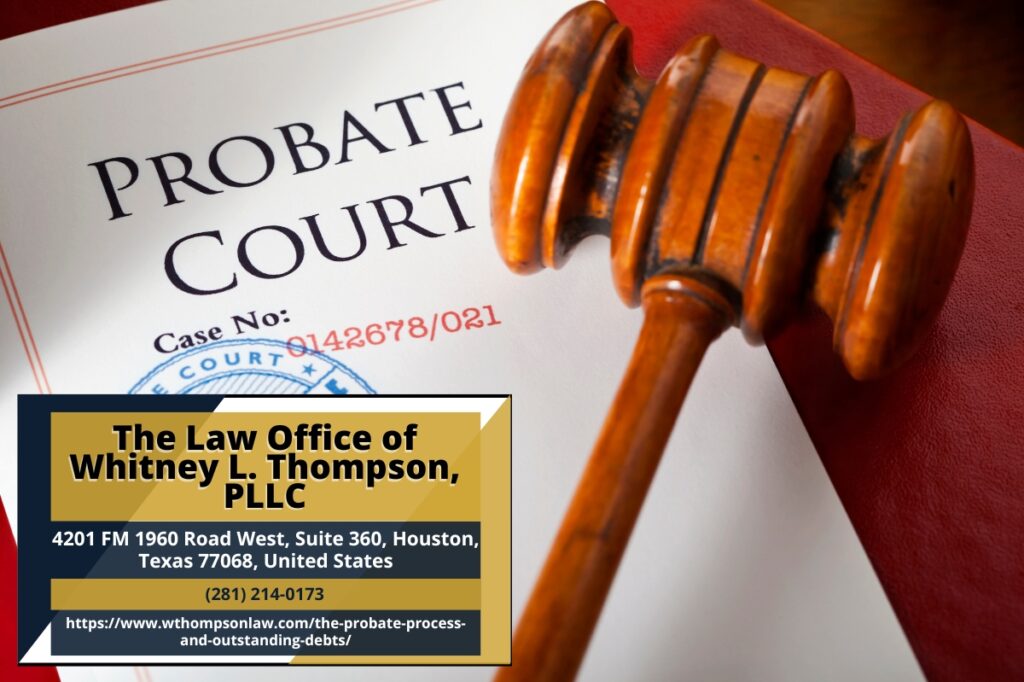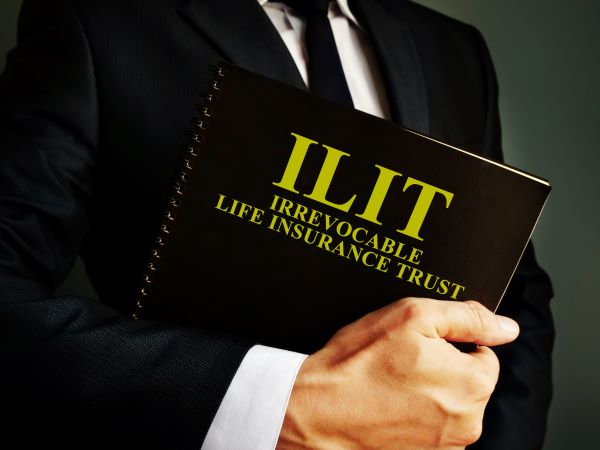The probate process, a legal procedure for administering a deceased person’s estate, often involves addressing outstanding debts and financial obligations left behind by the deceased individual. It plays a crucial role in ensuring that the deceased’s estate is managed appropriately and that creditors are paid their dues before the remaining assets are passed onto the heirs or beneficiaries. Contested or uncontested probate can be challenging, making it essential for those involved to navigate the process with care to address any outstanding debts effectively.
Navigating the details of the probate process and addressing outstanding debts can be a difficult and overwhelming task. At The Law Office of Whitney L. Thompson, our Houston probate attorneys can provide the legal guidance and support you need. We can assist you in identifying creditors, managing assets, and properly handling outstanding debts in accordance with the law. Contact us at (281) 214-0173 to schedule a consultation and receive assistance with your probate and debt-related matters.
What Is the Probate Process?
The probate process involves validating a deceased person’s will, appointing an executor, identifying and appraising assets, paying debts and taxes, and distributing the remaining estate to beneficiaries. The process typically takes 6–12 months but can extend depending on the size of the estate or disputes.
What Are Outstanding Debts in Probate?
Outstanding debts in probate are unpaid obligations owed by the deceased at the time of death. These include credit card balances, medical bills, mortgages, personal loans, and unpaid taxes. The estate must settle these debts before distributing assets to heirs or beneficiaries.

How to Handle Estate Debts and Creditors in Probate
Personal representatives, beware. Do not distribute assets to beneficiaries before the balance of the estate’s taxes and all outstanding debts are completely paid or dismissed by the probate court. It is the responsibility of the personal representative to cover all estate expenses, and you may become personally liable for deficiencies in estate debt payments unless beneficiaries return their portions of inheritance to cover those outstanding debts. If you feel you must make a partial distribution to heirs, withhold enough monies to cover all estimated expenses.
If the decedent’s property does not go through the probate process, creditors’ claims remain pursuable for a longer time. Partly this is because there is no legal requirement to notify creditors of a person’s death. A creditor who discovers the death may find the debt too small to justify pursuing collection. In some cases, writing off the bad debt for tax purposes may be more beneficial than seeking repayment that offers little financial return.
In other cases, an estate may not have liquid assets yet hold real property with enough value to cover the outstanding debt claim if sold. Valuable inheritable property can be lost to a forced sale to cover creditor claims in probate court. A creditor forcing this type of sale drags out probate proceedings, incurring additional costs. Secured creditors receive priority over unsecured creditors. Banks are the primary secured creditors with which a personal representative may have to contend.
Suppose a person dies with substantial debt and there are limited assets to cover these debts. In that case, the estate is deemed insolvent, and there is a generally accepted prioritization of debt payment by all states. A personal representative should always pay debts in order of a state’s recognized priority list. Otherwise, debts that may be dismissible, pro-rated, or forgiven may receive payment, while secured debts never “go away.” It is essential to understand the priority order for estate debts. Note that these are generalities, and some state laws may prioritize these categories differently.
- Administrative costs: Common costs include court fees, filing fees, notice costs, attorney’s fees, and the administrator’s commission.
- Family exemptions: Many states will provide for payments helping family members handle their living expenses during the estate’s probate. This family exemption usually gets high priority to lessen financial stress as a family mourns the loss of their loved one.
- Funeral and burial costs: These expenses address funeral and burial costs by state law. Costs of cremation, interment, urns, markers, and associated funerary service costs are permissible as part of funeral and burial costs.
- Government debts: Income taxes, property taxes, and estate taxes take priority over other debt obligations.
- Final medical bills: The decedent’s final sickness or injury receives priority over other unsecured debts. Some hospitals will reduce final medical bills if the newly negotiated amount is paid promptly and in full.
- All other claims: Usually, states do not prioritize these other more general unsecured debts. Some cases permit debt payment based on the filing date of claims, and other times debts may be pro-rated.
Assets such as retirement accounts and insurance proceeds with a designated beneficiary receive different treatment and provide more protection from creditors. The same holds for an irrevocable trust which upon death also provides protection from creditors. A beneficiary designation and specific trust entity can help shield an estate from a heavy debt burden.
When someone dies, their estate assets must be secured and eventually distributed according to the existing Will or state intestate laws. Another vital function of the estate is for the personal representative to ensure the decedent’s genuine debt obligations receive payment. When an estate has sufficient assets to pay all outstanding debts, payment can occur in any order. If the estate leans to insolvency, the personal representative should withhold asset distribution to heirs until the probate court approves the debt fulfillment priorities. Please contact our Houston office at (281) 214-0173 or the Bay City office at (979) 318-5079 today and schedule an appointment to discuss how we can help you with your legal matters.
| General Priority Order for Estate Debts | Description |
|---|---|
| Administrative costs | Administrative costs include court fees, filing fees, notice costs, attorney’s fees, and the administrator’s commission. |
| Family exemptions | Many states prioritize payments to help family members handle their living expenses during the estate’s probate, reducing financial stress during a time of mourning. |
| Funeral and burial costs | These expenses cover funeral and burial costs, including cremation, interment, urns, markers, and associated funerary service costs, as dictated by state law. |
| Government debts | Government debts, such as income taxes, property taxes, and estate taxes, take precedence over other debt obligations. |
| Final medical bills | The decedent’s final medical bills resulting from illness or injury are given priority over other unsecured debts. Some hospitals may reduce these bills if paid promptly. |
| All other claims | Generally, states do not prioritize other general unsecured debts, although payment may sometimes be based on the filing date of claims or pro-rated in some cases. |
Steps to Verify and Challenge Estate Debt Claims
When handling an estate through probate, verifying and challenging debt claims is a crucial responsibility of the executor. This process helps protect the estate from paying invalid or overstated debts. This procedure is governed by the Texas Estates Code and involves several key steps:
- Verification of Claims: The executor first receives and reviews claims from creditors. Each claim must be supported by documentation, such as invoices, promissory notes, or contracts, verifying the amount owed and the debt’s legitimacy. This step also involves checking the dates to confirm that the debt is still enforceable and not beyond the statute of limitations, which is typically four years in Texas for most unsecured debts.
- Notification of Creditors: Upon the death of the estate holder, creditors must be notified through a public notice, typically published in a local newspaper. Creditors have four months from the date of publication to submit claims. Additionally, secured creditors must receive direct notice by certified mail within two months of the executor’s appointment.
- Assessment of Claims: After receiving claims, the executor assesses them against the estate’s records. If discrepancies appear, such as an inflated bill or a claim for a debt already paid, these issues need addressing. The executor has the authority to dispute incorrect claims by providing evidence to the contrary.
- Dispute Resolution: If a creditor disagrees with the executor’s assessment, they may challenge the decision in probate court. The court then reviews the documentation from both sides and makes a final decision on the claim’s legitimacy and the estate’s liability.
- Settlement of Approved Claims: Once a claim is verified and approved, it is ranked according to priority defined by Texas law, starting with funeral expenses and last illness costs, followed by administrative expenses, secured claims, and then unsecured claims.
The executor plays a key role in this process, managing the estate’s assets to properly settle valid debts while protecting the interests of both creditors and heirs. Disputed claims that escalate to court require careful handling, where legal guidance might be necessary to navigate the procedural requirements effectively.
What Happens After Probate?
Under the guidelines of Texas probate law, the probate process is regulated by the Texas Estates Code. It usually begins with the submission of a probate petition to the probate court. The court will then validate the will and appoint an executor or administrator responsible for managing the distribution of assets. After settling all outstanding debts and taxes, the executor or administrator will move forward with the allocation of the remaining assets to the specified beneficiaries.
Once probate proceedings have concluded, there are several crucial steps to be taken in order to ensure the proper resolution of all matters:
- Obtaining Certified Copies of the Death Certificate: The first post-probate responsibility is to secure official copies of the death certificate. These copies are crucial for closing accounts, transferring assets, and resolving various estate-related issues. Certified death certificates can be obtained through the Texas Department of State Health Services.
- Review the Will and Trust Documents: Following the probate process, it is advisable to thoroughly review the will and any trust documents to gain a clear understanding of your rights and responsibilities as a beneficiary. Should you have any questions or concerns, it is crucial to seek guidance from a probate attorney who can assist you in handling the legal details.
- Transfer Assets to Beneficiaries: Once the distribution of assets has taken place, the next step is to transfer these assets to the designated beneficiaries. This may involve actions such as closing accounts, transferring ownership titles, and completing other necessary legal procedures. Adhering to the appropriate protocols is essential to ensure that these transfers are executed in a legal and ethical manner.
- File Estate and Income Tax Returns: Post-probate, it is mandatory to file both estate and income tax returns for the deceased individual’s estate. This includes submitting a final income tax return on behalf of the deceased and if required, an estate tax return. If you are uncertain about the procedures for filing these returns, seeking assistance from legal and tax professionals familiar with this area can be beneficial.
- Estate Closure: In Texas, it is not traditional to formally close an estate. This approach allows for the easy transfer of assets to the estate in the event that any additional assets are discovered in the future.
Discover the peace of mind you deserve as you handle the challenges of post-probate matters with the guidance of an experienced Houston probate attorney. From asset distribution to the resolution of estate disputes, our skilled attorneys at The Law Office of Whitney L. Thompson can assist you every step of the way. Contact us at (281) 214-0173 for a smooth transition after probate and to protect the interests of your loved ones.







